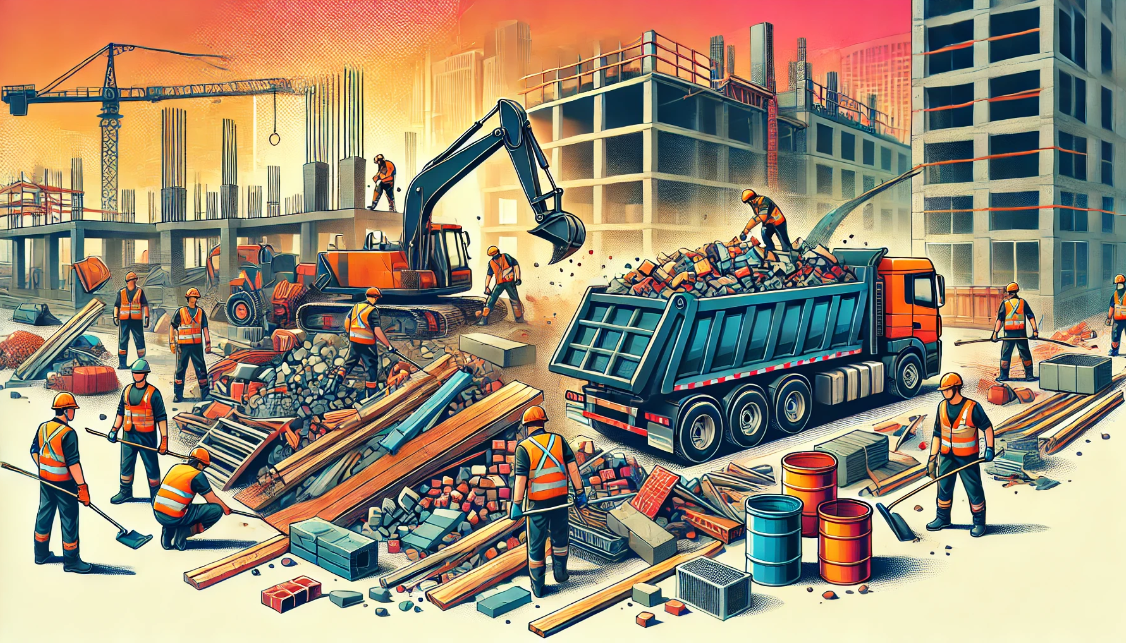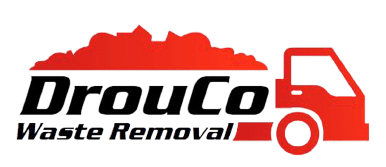
Construction Debris Removal: A Complete Guide for Clean and Safe Job Sites
Every construction project—big or small—comes with a lot of debris. From leftover drywall to concrete chunks and wood scraps, it’s easy for a site to turn into a cluttered mess. Construction debris removal services are here to help, ensuring your job site remains clean, safe, and compliant with regulations. This guide will walk you through the basics of construction debris removal, from different types of waste to eco-friendly disposal options, and how to find the right service for your needs.
Why Construction Debris Removal Matters
Removing debris isn’t just about keeping a site tidy; it’s a matter of safety, efficiency, and environmental responsibility. Here’s why it’s essential:
- Safety First: Piles of waste can be hazardous, leading to accidents and injuries. Proper removal keeps pathways clear and helps reduce risks for everyone on-site.
- Improved Efficiency: A clean work area enables workers to move around more freely, improving productivity and minimizing delays.
- Environmental Responsibility: Many construction materials are recyclable, so eco-friendly removal services can help reduce landfill waste and promote sustainable practices.
A well-maintained job site not only reflects positively on your business but also fosters a safer and more productive work environment.
Common Types of Construction Debris
Every construction site produces various types of debris, each requiring specific disposal methods. Here’s a look at the most common types of construction waste and how they’re typically handled:
| Debris Type | Examples | Best Disposal Method |
|---|---|---|
| Concrete and Asphalt | Concrete slabs, asphalt chunks | Recycling or concrete crushers |
| Wood and Lumber | Untreated wood, pallets, plywood | Recycle or repurpose |
| Drywall and Plaster | Gypsum boards, plaster, drywall scraps | Specialized recycling facilities |
| Metal | Steel, aluminum, copper wiring | Scrap metal recycling |
| Brick and Masonry | Bricks, stones, masonry scraps | Recycle or repurpose |
| Glass | Windows, mirrors, glass doors | Glass recycling centers |
| Hazardous Materials | Asbestos, lead-based paint, chemicals | Specialized disposal, follow regulations |
Benefits of Professional Construction Debris Removal
1. Time-Saving and Efficient
- Construction projects are usually on tight schedules. Hiring a debris removal service allows your team to focus on the build instead of worrying about cleanup. Professionals handle everything from collection to disposal, saving valuable time.
2. Safety and Compliance
- Junk removal companies understand safety regulations and proper disposal procedures. They’ll ensure hazardous materials are handled correctly, which helps you avoid fines and keeps everyone on-site safe.
3. Eco-Friendly Disposal Options
- Professional removal services often partner with recycling centers and donation facilities to reduce landfill waste. By using these services, you’re contributing to a more sustainable building industry.
4. Cost-Effective for Large Projects
- Debris removal services may seem like an added expense, but they often save money in the long run by reducing the labor hours needed for cleanup. They also prevent costly penalties associated with improper disposal.
How to Choose the Right Construction Debris Removal Service
When selecting a debris removal service, there are a few key considerations:
- Experience with Construction Sites: Look for a company familiar with the specific demands of construction debris removal.
- Pricing Transparency: Some companies charge by volume, others by weight. Request quotes and compare to avoid hidden fees.
- Recycling and Eco-Friendly Disposal: Check if the service has a commitment to recycling or donating usable materials to keep waste out of landfills.
- Licensing and Insurance: Make sure the company is licensed and insured, particularly if they’ll be handling hazardous materials.
- Customer Reviews and Recommendations: A quick check on Google or Yelp can provide insights into the company’s reliability and service quality.
Construction Debris Removal Options: What to Expect
Each project has different cleanup needs, and debris removal companies often offer tailored options to fit these requirements. Here’s a look at popular options and what each entails:
| Service Type | Ideal For | Pros | Cons |
|---|---|---|---|
| On-Demand Pickup | Small to medium-sized debris loads | Quick, flexible scheduling | More costly for large projects |
| Roll-Off Dumpster Rental | Large, ongoing projects | Cost-effective for big loads | Requires space for dumpster placement |
| Daily or Weekly Cleanups | Active, high-debris sites | Keeps site consistently clean | Ongoing cost |
| Recycling and Donation Sorting | Reusable materials, scrap metals | Eco-friendly, reduces landfill waste | May require extra sorting fees |
| Hazardous Waste Removal | Asbestos, lead, other regulated items | Ensures safety and compliance | Higher cost due to special handling |
Tips for Efficient Construction Debris Management
Here are some strategies for keeping your construction site clean and efficient:
Plan for Debris Removal from the Start
- Include debris removal in your project plan, assigning specific times or phases for cleanups. This helps avoid last-minute chaos and ensures a safer, tidier worksite.
Organize Debris by Type
- Sort debris into categories: wood, metal, concrete, and general trash. This makes it easier for removal teams to recycle, donate, or properly dispose of each material.
Consider Dumpster Rentals for Major Projects
- For long-term projects, having a roll-off dumpster on-site is a smart choice. Workers can dispose of waste as they go, preventing clutter from building up.
Recycle and Repurpose Whenever Possible
- Recyclable materials like metal and wood can often be reused on-site or taken to recycling centers, saving you disposal fees and reducing waste.
Partner with a Reliable Removal Service
- Building a relationship with a reputable junk removal company can simplify future projects. They’ll be familiar with your site needs and offer efficient, reliable services.
Frequently Asked Questions (FAQs)
Q: How much does construction debris removal cost?
- Costs vary depending on the volume and type of debris, but expect to pay between $300 and $800 for medium-sized projects. Dumpster rentals may range from $300 to $500 per container.
Q: What types of debris can be recycled?
- Many construction materials can be recycled, including concrete, wood, metal, and glass. Contact a recycling center or junk removal service to confirm what’s accepted in your area.
Q: Can I handle construction debris removal myself?
- For small projects, DIY removal is possible, but larger or hazardous waste typically requires a professional service to handle safely and in compliance with local regulations.
Q: Is it possible to get same-day debris removal?
- Many junk removal companies offer same-day or next-day services, especially for smaller pickups. Larger projects may require scheduling a few days in advance.
Q: Do construction debris removal companies recycle materials?
- Yes, many companies prioritize recycling materials like metal, wood, and concrete. Always ask about their recycling policies to ensure eco-friendly practices.
Phone
Contact us
If you have any questions or need any assistance after business hours, please get in touch.
Business Hours
- Mon - Fri
- -
- Sat - Sun
- Closed

Contact Us
We will get back to you as soon as possible.
Please try again later.
All Rights Reserved | Drouco Waste